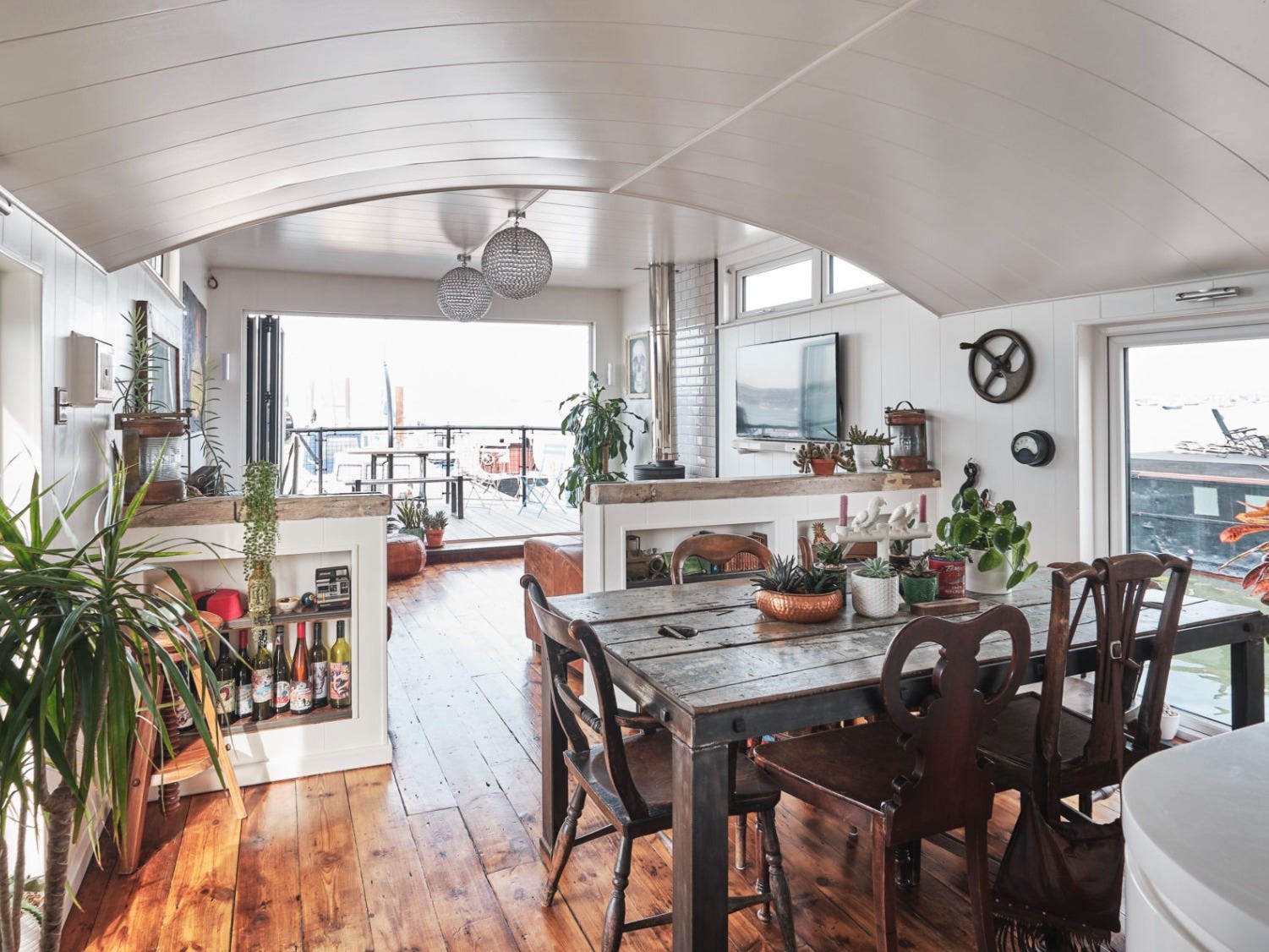- Houseboats and floating homes offer people a chance to live near cities while avoiding high real estate prices.
- Their mobility also allows homeowners great flexibility.
- Hannah Widders, the owner of a houseboat docked in the UK, told Insider she’s still getting used to the small space but loves living among nature while having access to the city.
- Visit Insider’s homepage for more stories.
In recent years, demand for houseboats and docking space in major cities has risen. Houseboats offer a rare chance to live in close proximity to a city but oftentimes at a relatively cheaper price than conventional real estate.
One houseboat owner, Hannah Widders, is still getting used to the small space after more than five years. But she told Insider she loves the flexible lifestyle and the chance to live among nature while also staying near a city.
Here are 26 photos of houseboats that may inspire you to live on the water.
Houseboats, which used to be a more nomadic, alternative living choice, are now a trendy way to live near popular cities.
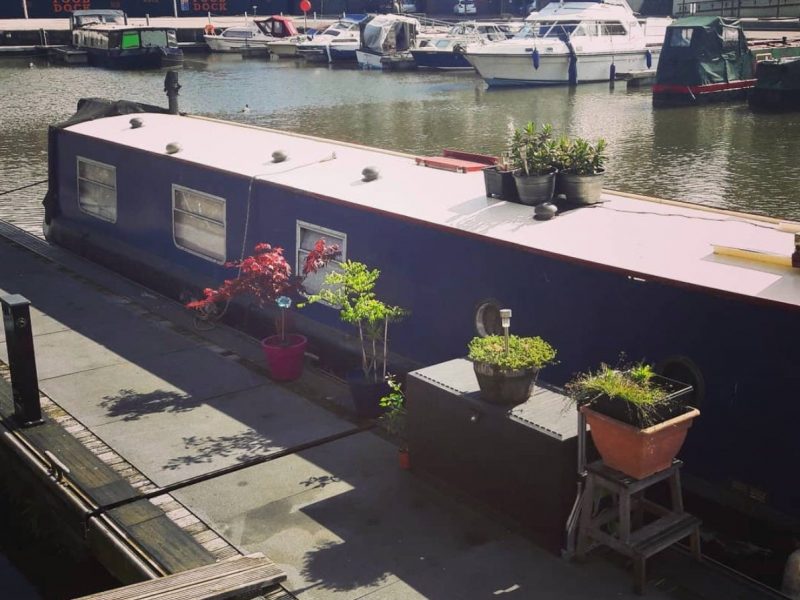
Hannah Widders, who has a houseboat docked in Gloucestershire in England, decided to look into the idea after graduating from the Navy.
Widders was in pursuit of a bohemian living situation and considered van life first before settling on her boat.
Widders has always loved being in nature, and a boat provided the tranquility that comes with being on the water.
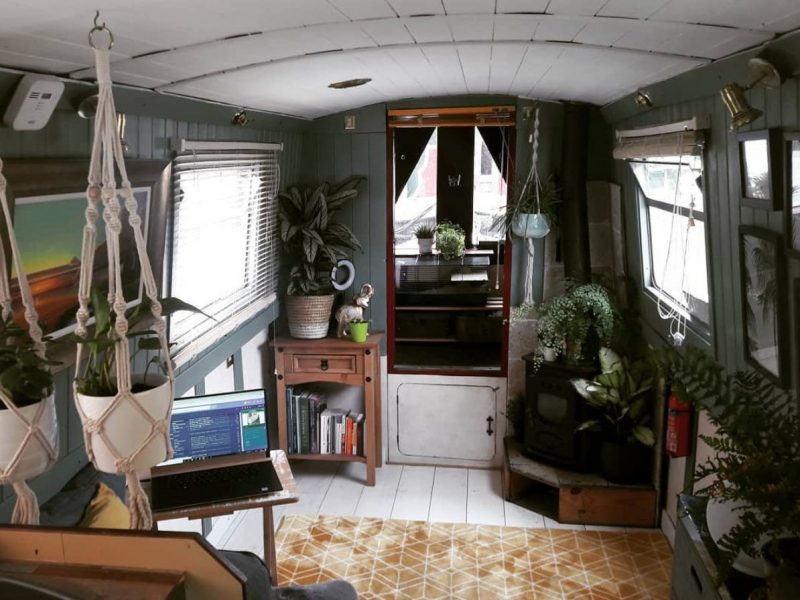
While the lifestyle that accompanies the houseboat is enticing, it helped that living on a boat was a much more economical way to afford living in Gloucestershire.
Widders eventually purchased her boat for around $24,000.
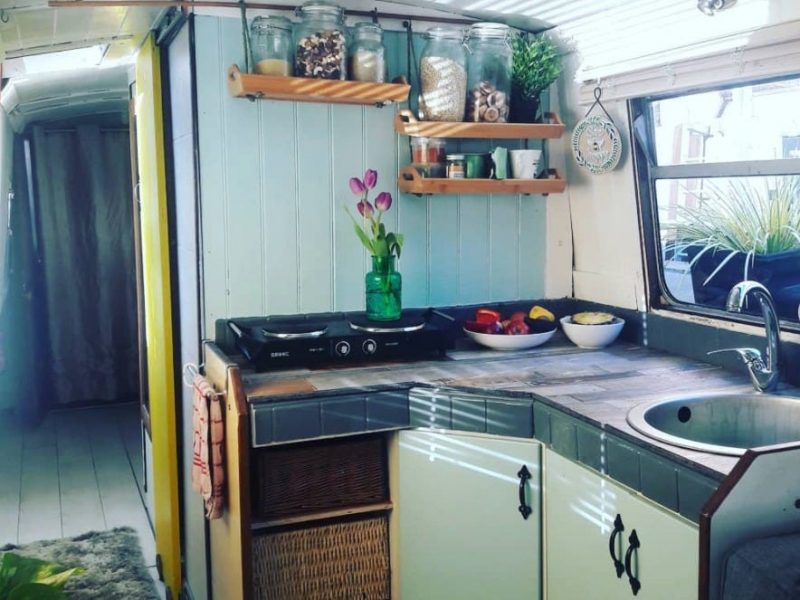
"As long as you keep it up to date, houseboats don't tend to lose value," Widders said.
Widders also debated a sublet-type situation in the city, but she estimated she would be paying around $630 a month. After purchasing her boat, she now only has to pay a monthly docking fee of a little over $200, which also comes with a free water tap.
Her other large cost is a yearly fee of just under $900, which covers her boat insurance and canal license. Every four years, Widders has to get the bottom of the boat sprayed and sealed, but it is only a small maintenance fee.
The houseboat allows her the freedom to easily move around for different job opportunities.

One aspect that attracts people to van life and tiny homes is the mobility, and houseboats share a similar level of flexibility.
"I can relocate easily for a job as long as there is a canal, and England has plenty," said Widders, who is now a landscape architect.
The mobility is also perfect for taking the boat on weekend trips.

Houseboats make it easy to travel on your own and take weekend trips with very little planning. When traveling in the winter, Widders says the engine effectively heats her entire boat.
The London real estate market offers other upscale houseboats, like this one, as a trendy way to live in the heart of the city.

The 58-foot-long houseboat in Regents Canal has one bedroom with a double bed, one bathroom, and a galley kitchen, according to the listing.
In London, the number of people living on houseboats has doubled since 2012, becoming a popular alternative to renting or buying real estate in the city. Now there are estimated to be around 5,000 houseboats. According to the Canal River Trust and the Inland Waterways Association, the houseboat lifestyle is so popular, that growth is expected to hit 35-52% by 2022.
Plenty of houseboat interiors are painted white to help the space feel larger.
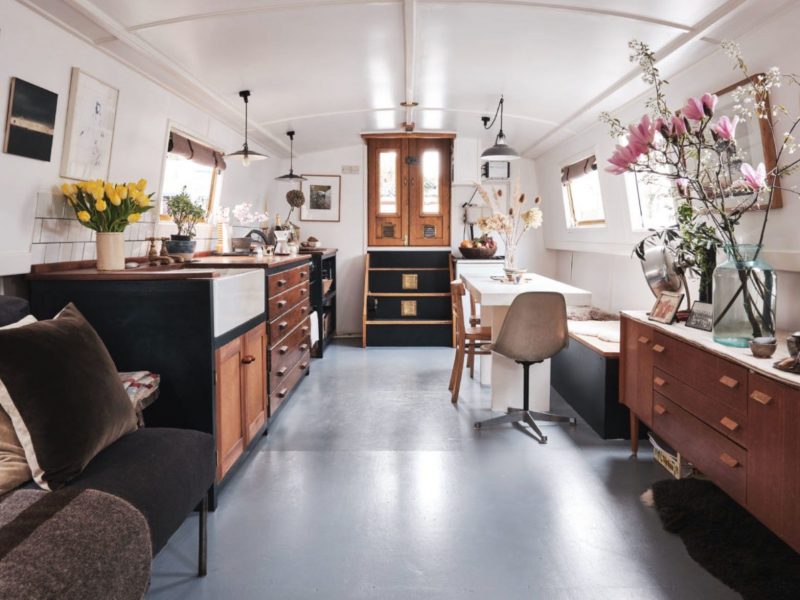
The owners of this boat "have carefully [curated] the space, collecting reclaimed furniture and retro pieces that fit perfectly," the listing reads.
As for Widders, when she first bought her boat, "It was dark wood and full of spiders, so I painted the entire thing white so that I could see the spiders," she said.
Buying a houseboat that is completely remodeled, like this one in Regents Canal in London, can be an advantage.

Finding furniture and equipment that fits through the narrow door can get tricky.
The bedroom has a double bed, as well as a fitted wardrobe.

The houseboat community is strong, and there are plenty of online resources that offer advice and tips to moving into living in a small space.
But you might need to get creative with storage space on a houseboat.

Similar to tiny house living and van life, houseboat owners often find unconventional ways to store their belongings.
It's not uncommon for houseboat owners to cut down on their belongings to make way for the essentials.

Widders has eight drawers for her clothing, which she rolls very tightly to make sure the dresser can shut. She said, "I like to keep everything in order because it's such a small space, it's so easy for it to feel cluttered."
Not every houseboat is small: This 1,250-square-foot houseboat has three bedrooms.
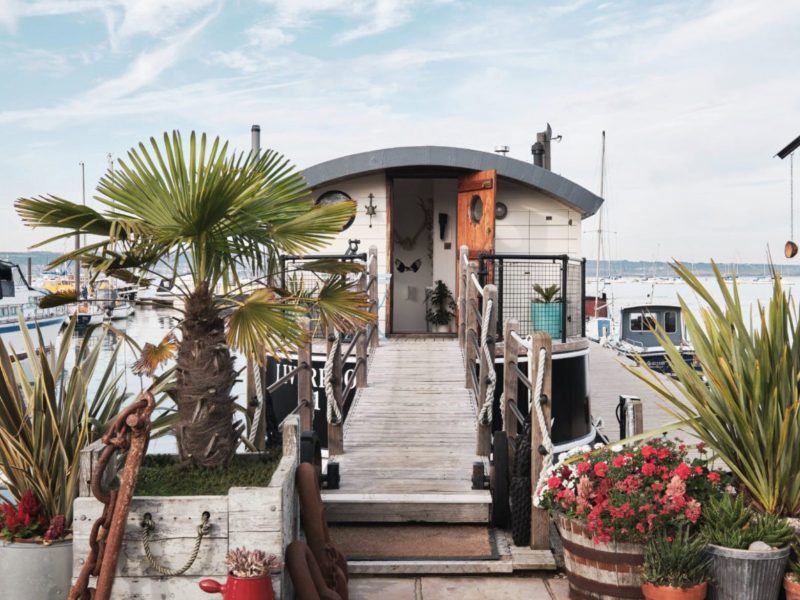
The home is in Gosport, England.
It even has two floors. Its top deck features an open-plan living room, dining room, and kitchen.
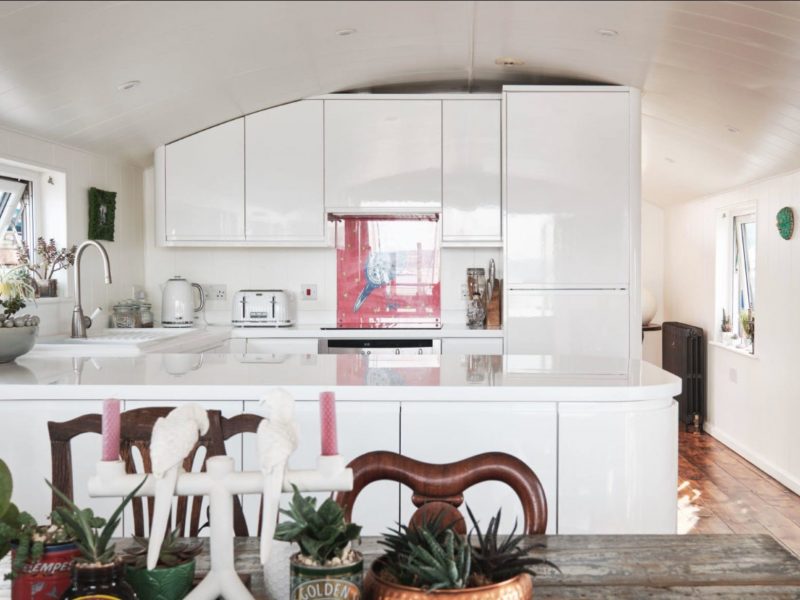
There's also a bathroom on the top deck, according to the listing.
It has three bedrooms, including this one with under-bed storage.

It has a master bedroom and two others.
While bathrooms can be small, this modern bathroom features a finished tub and plenty of natural light.
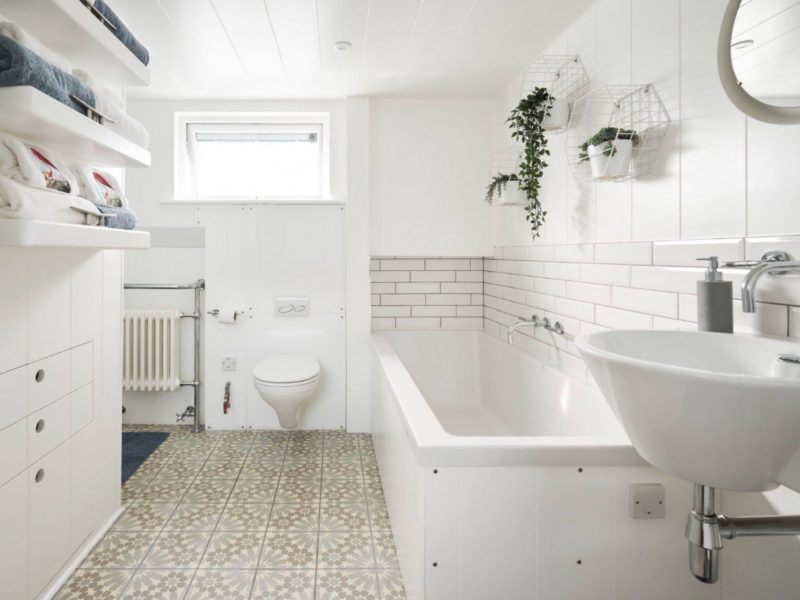
Using the bathroom in a houseboat is worry-free once you sort out the logistics. One method to waste management is to hook your boat up to a pump-out station, where waste is sucked out and discharged. If you are cruising on the water, a holding tank needs to be installed.
The wooden flooring in the houseboat was taken from a Victorian school that dated back to 1865, according to the listing.

It has high ceilings, too.
Widders, who is 5 ft 9 inches, said her ceilings are 6 feet high. Whenever she returns to the boat after spending a fair amount of time on land, she said she always feels hunched over for a few days before readjusting.
While storms may force houseboat owners to come inside, an open yet cozy space still awaits them.
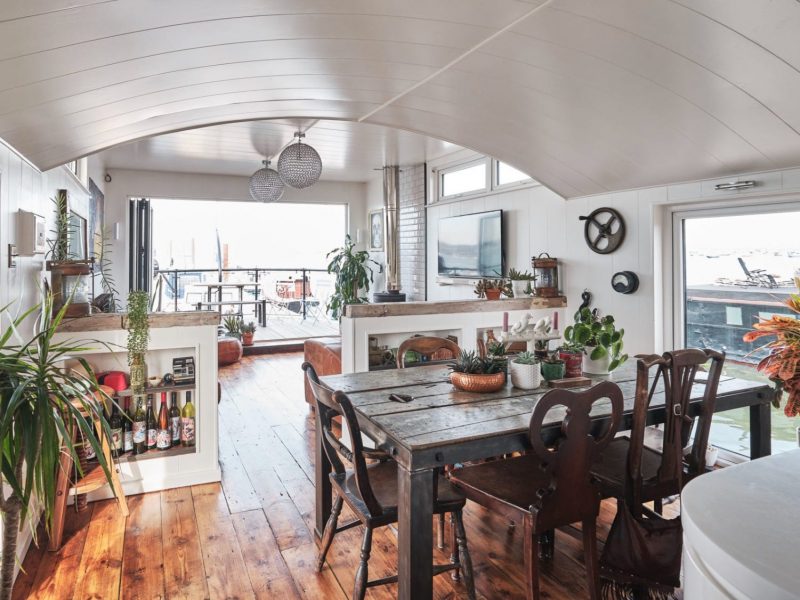
During a storm or bad weather, boat owners may feel the waves and currents underneath their feet, but generally, boat owners adapt to living on the water and don't feel its effects.
Houseboats come in all shapes and sizes. This wide beam canal boat is also docked in London.
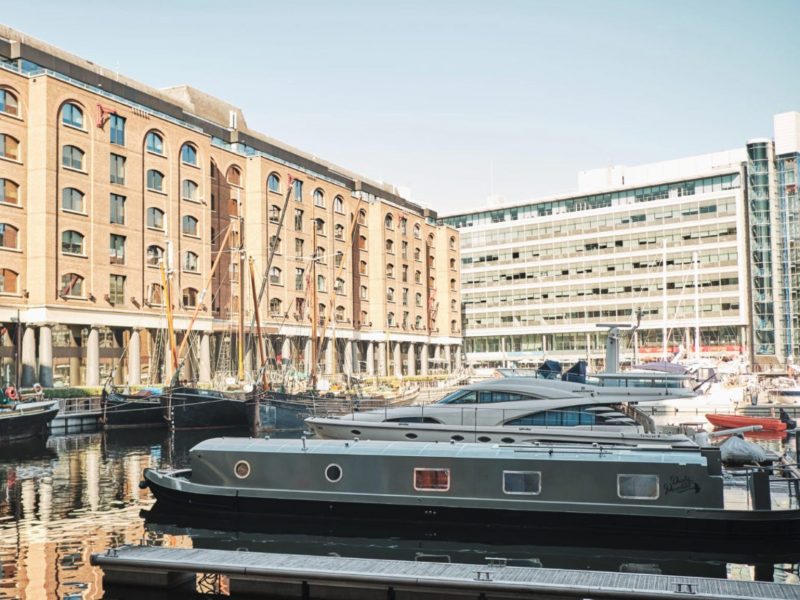
The number of people a houseboat can support depends on the size of the boat, so the smaller the boat you have, the less likely you will be able to entertain in big groups.
In Widders' case, friends are always curious about her boat and requesting to stop by. During one visit, ten friends came over, and when she peeked outside, the water level had risen significantly up her boat and everyone had to rush off.
With windows on both sides, there is always natural light and never a bad view from inside the boat.

As a result, it provides a tranquil escape from crowds and city life.
More modernized houseboats feature additions to enhance the owner's comfort, such as this houseboat, which has underfloor heating.
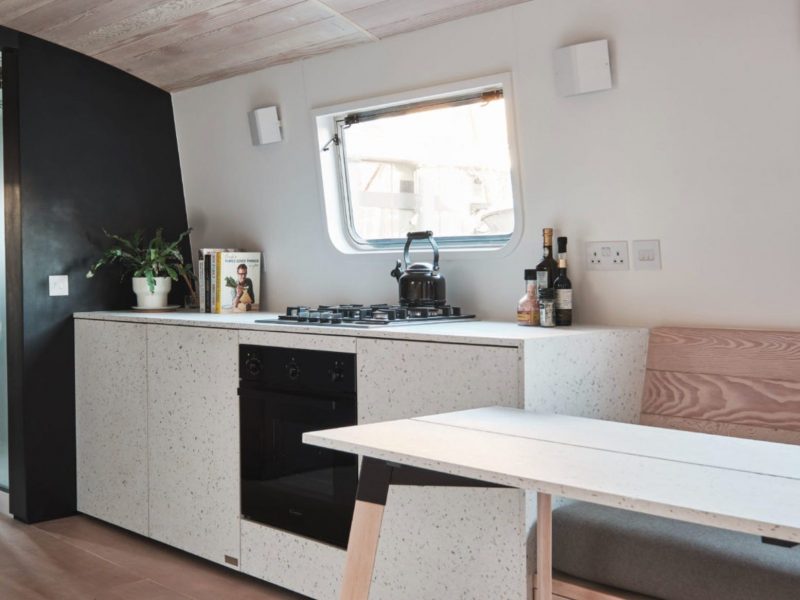
This modern boat has a washing machine and dish washer, as well as solar panels.
Widders also has solar panels, which means she only has to pay a small electricity bill through the winter, usually about $25 a month.
The steps and seating on this boat are all designed to open up for extra storage, and a television is concealed on the wall.
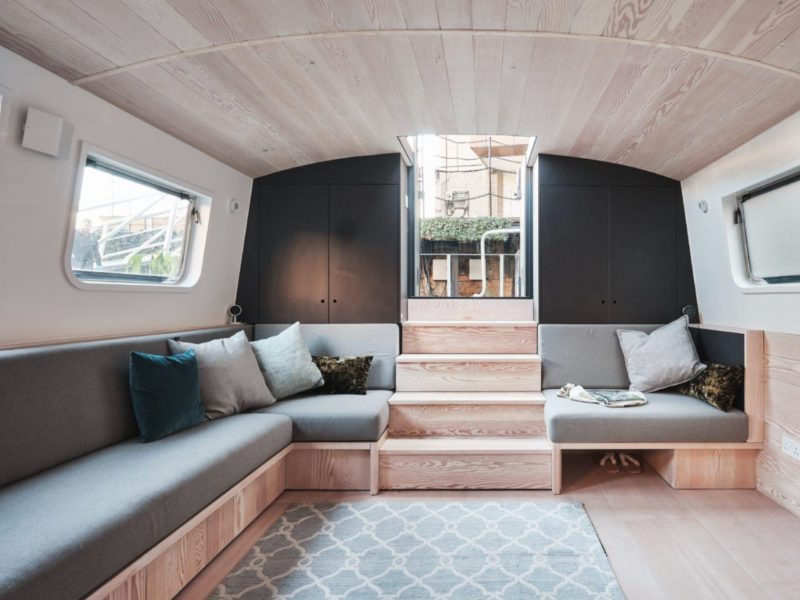
Similar to tiny homes, houseboats have plenty of hidden features that secretly keep the space livable.
Found in St. Petersburg, Russia, this floating home has four bedrooms.
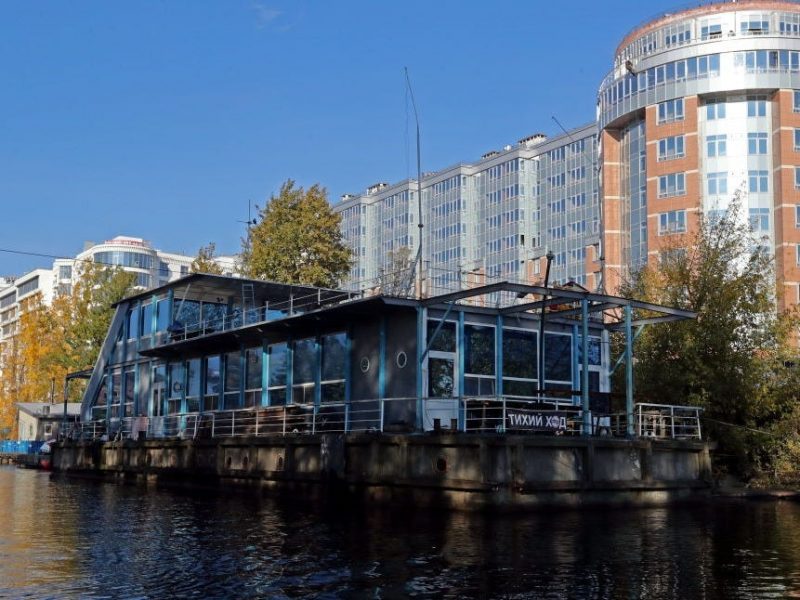
The home owned by the Afonin family is on the Zhdanovka River in Petrogradsky District of St. Petersburg, Russia.
The floating home has two stories, four bedrooms, and a fireplace.

While houseboats have a motor, floating homes are actual homes, just built on floats and anchored to a dock.
The floating home has separate rooms, offering family members privacy and helping the space feel larger.

For those unconcerned with the nomadic, flexible lifestyle that comes with owning a houseboat, a floating home is a great option.
Instead of keeping a garden on the dock, the family has enough space for a trampoline.

This floating home is docked in a residential mooring.
Floating homes and houseboats offer a unique living situation — and a sense of community.

The New York Times reported that living alongside other houseboats on a dock offers "vibrant social communities."
Widders envisions herself eventually making an exit from the dock - but not from the water.
"I eventually want to learn to sail ... buy a sailboat and travel more," she said.
- Read more:
- Inside the unregulated tiny house movement, where some people say builders do shoddy work or don't deliver at all: 'It turned into the Wild West'
- 25 disappointing photos that show the ugly truth of living in a tiny house
- 17 photos that show the ingenious ways tiny house owners store their belongings
- Rent in cities like NYC and San Francisco is so expensive that it's pricing people out of the real-estate market, and some of them are turning to houseboats instead
